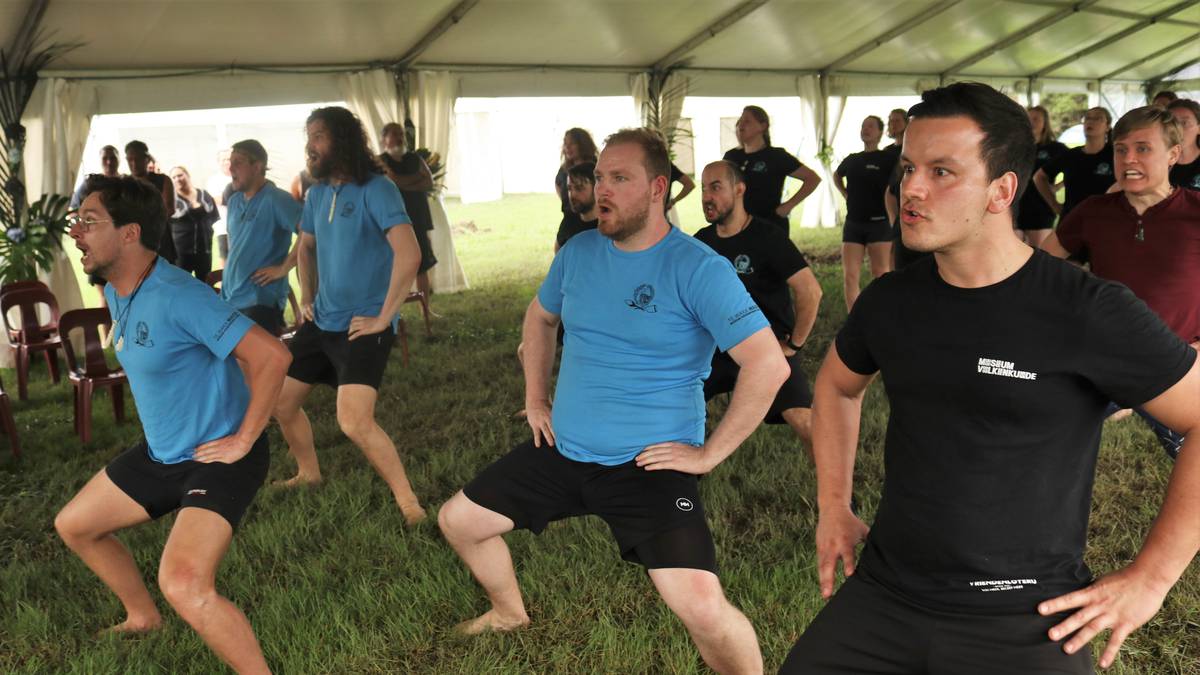The Dutch waka group performs the haka Tangaroa at “Tent City” waka camp in Haruru, near Waitangi, during a visit by new Deputy Prime Minister Carmel Sepuloni. Video / Peter de Graaf
A group of Dutch paddlers who have travelled halfway around the world to take part in Waitangi Day’s waka pageant are a great example of how non-Māori can embrace Māori culture, new Deputy Prime Minister Carmel Sepuloni says.
Sepuloni visited the annual waka camp at Bledisloe Domain, in Haruru, on Saturday to meet members of a waka group from the Netherlands who are the caretakers of the only Māori waka based in Europe.
The waka Te Hono ki Aotearoa (The Link to New Zealand) was carved in the Far North by master waka builder Sir Hekenukumai Busby for the Dutch national ethnology museum.
It is paddled during major cultural events around Europe by trained members of the Njord Royal Rowing Club from nearby Leiden University.
Advertisement
Their training includes regular visits to Waitangi to re-immerse themselves in Māori culture.
Sepuloni said she had visited the group when she was in the Netherlands last year and had been impressed by the genuine way in which they engaged with te ao Māori (the Māori world) and matauranga Māori (Maori knowledge).
She had also been awed by their haka.
“In Aotearoa we have some issues with non-Māori engaging with things that are Māori. If people on the other side of the world can genuinely engage in Māori culture, it can certainly happen here,” Sepuloni said.
Advertisement
A total of 26 Dutch paddlers are taking part in this year’s Waitangi commemorations. They are led by Koos Wabeke, who has been involved in the project since its inception in 2010.
Wabeke said he was “extremely proud” of how a group of Dutch students who 13 years ago knew nothing of Māori culture had since built up kaupapa waka in the Netherlands.
The connection they now felt with the Māori waka community was “something beautiful we’ve never felt outside our families”.
/cloudfront-ap-southeast-2.images.arcpublishing.com/nzme/IQBBAQDCO5FFZLLOYAGXB5J7FM.jpg)
Also taking part in Saturday’s visit were Dutch ambassador Ard van den Vorst and the instigator of the Dutch waka project, former museum director Steven Engelsman.
Van den Vorst said people in his role came and went but the waka group members were the real ambassadors.
The waka project had sparked huge interest in the Netherlands and there was much the Dutch could learn from Māori.
That included the way Māori perceived themselves as being part of the natural world and “an openness and inclusivity we need in a world that is rapidly changing”.
/cloudfront-ap-southeast-2.images.arcpublishing.com/nzme/2WQX6VXYX5HEJH7ERHWSF3MTL4.jpg)
The Dutch aren’t the only international paddlers this year.
Also taking part on Monday will be about eight indigenous Australians and four Native American paddlers from the Suqamish and S’Klallam tribes of Washington State, near Seattle.
Former Suqamish chairman Bennie Armstrong said the waka revival in the US began in 1989, around the same time as in Aotearoa.
Advertisement
Tribes along the northwest US coast now held a month-long canoe voyage every year called Tribal Journeys.
“The energy of Waitangi is exactly the same as Tribal Journeys. Young kids camping, singing, and weaving. It’s the same energy with young people here.”
Sepuloni said she was not Māori — she was Samoan-Tongan with a Fijian husband — but waka connected all Pacific peoples.
/cloudfront-ap-southeast-2.images.arcpublishing.com/nzme/PO6NT5JOORABHPMVQI63TBULYQ.jpg)
/cloudfront-ap-southeast-2.images.arcpublishing.com/nzme/HIJPMFXYVBF3RK4LJ2VIYJ2U2U.jpg)




